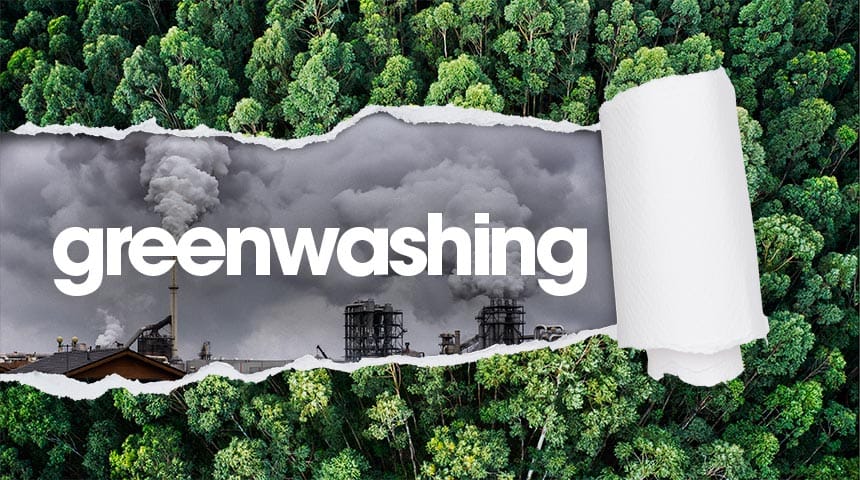"Greenwashing has grave unintended consequences". How to stop your company falling foul. A 2024 guide and perspective from BCorp organisation, Ecologi
Greenwashing detracts from the genuinely great work that many businesses are doing. It also erodes trust and creates cynicism towards the whole idea of climate action. And this can have real consequences for the environment.

What is greenwashing – and why is it so controversial?
There’s no doubt about it, Greenwashing has become a very dirty word. It’s been a hot topic for the past decade, but it’s really been put under the spotlight over the last couple of years, and it even made it onto the COP27 and COP28 agendas. At Ecologi, we aim to inspire and empower businesses to accelerate sincere global climate action through verified, certified projects.
Greenwashing is a behaviour which, through making misleading or unsubstantiated claims, causes people to believe that an organisation or individual is generating a greater environmental benefit than it actually is.

And here’s the thing: Greenwashing detracts from the genuinely great work that many businesses are doing. It also erodes trust and creates cynicism towards the whole idea of climate action. And this can have real consequences for the environment.
Here are just a few of the problems that come from greenwashing:
It’s deliberately deceiving
When businesses and other organisations exaggerate or make false claims about their sustainability efforts, the deception can mislead consumers and undermine trust.
It exploits genuine concern
Greenwashing takes advantage of people’s growing concern for the environment. Many people genuinely want to support eco-friendly products and businesses, and greenwashing takes advantage of this.
It undermines legitimate efforts
Greenwashing diverts attention and resources away from businesses that are actually committed to sustainability. This creates an unfair advantage, and means the bad apples get all the publicity.
It can cause environmental harm
When companies falsely claim their products are sustainable, it can lead to consumers making choices that aren’t actually that great for the environment. They might think they’re making a greener choice, but are unknowingly making the issue worse.
It can lead to legal action
Those accused of greenwashing can now face regulatory and legal challenges. Regulatory bodies like the Green Claims Code have guidelines and rules against false advertising, and greenwashing can result in fines and legal action.
It creates scepticism
If people find out they’ve been misled, they might stop trusting the business, and possibly the whole idea of environmental marketing altogether. Their guard goes up, and scepticism towards legitimate eco-friendly products and businesses is the result.
It hinders progress
By creating a false sense of achievement, greenwashing can hinder environmental efforts. That’s because it gives businesses and consumers a sense that they’re doing enough, when really much more is needed.
Greenwashing vs greenwishing vs greenhushing – what’s the difference?
Greenwashing isn’t the only spanner in the works. Greenwishing and greenhushing have also emerged as issues blighting the climate cause. So what’s the difference?
Greenwashing
Greenwashing means misleading. It’s when a product, service or business is presented as being more sustainable than it really is. It tends to involve exaggerated claims of eco-friendly features and benefits.
For example, a company stamps “100% eco-friendly” all over its product packaging, but that product still contains harmful chemicals.
Greenwishing
Greenwishing is about insufficient action. It’s when a business has well-intended efforts as well as some delivered sustainability action, however, this work is unrepresentative compared to their size of business or the scope of change required to genuinely move the needle on decarbonising or creating sustainable change in a business.
For example, a business of 100 employees advertises that their only climate initiative is to plant a tree for every product they sell, without having any other carbon reduction initiatives to reduce their organisation’s emissions.
Greenhushing
Greenhushing means downplaying. It’s when a business keeps quiet about its environmentally-friendly initiatives (often through fear of greenwashing). It tends to involve businesses doing good things, but in a low-key way.
For example, a business gives £10,000 to a climate charity but chooses not to publicise it because they fear being criticised by their customers for their charity choice, or not investing in alternative opportunities for climate action.
In summary, greenwashing involves deceptive practices, greenwishing involves insufficient actions, and greenhushing involves under-communicating sustainability efforts. All three are problem areas for sustainability communications, whether they stem from inaccuracy, insincerity, or modesty.
Top tips to avoid greenwashing
So how can your business avoid the greenwashing trap? Here’s our top tips:
Use specific language to communicate impact and goals
For example: “Over the last five years we’ve made a 57% reduction in carbon emissions across our facilities. But we’re not stopping there, we’re aiming for 95% by 2026.”
Back up claims with third-party certification
For example: “The climate projects we support through our partner, Ecologi, are certified by the Gold Standard and Verified Carbon Standard.”
Make sure initiatives are supported by wider operational changes (and share the details)
For example: “Switching to recycled plastics is just the start of how we’re reshaping our entire business and supply chain. Visit our sustainability web page to find out more.”
Be honest about your sustainability journey (and areas for improvement)
For example: “We were proud to commit to net-zero operations by 2025, but now we’re raising the bar even higher and aiming for net-zero across our products and supply chain by 2040.”
You can read the fuller article from Ecologi here:
https://ecologi.com/articles/blog/how-can-businesses-avoid-greenwashing
Ecologi is a B Corp environmental organisation based in the UK that develops and funds certified environmental projects. They aim to "inspire and empower businesses to accelerate global climate action". Hear more about their work here: https://ecologi.com/about
